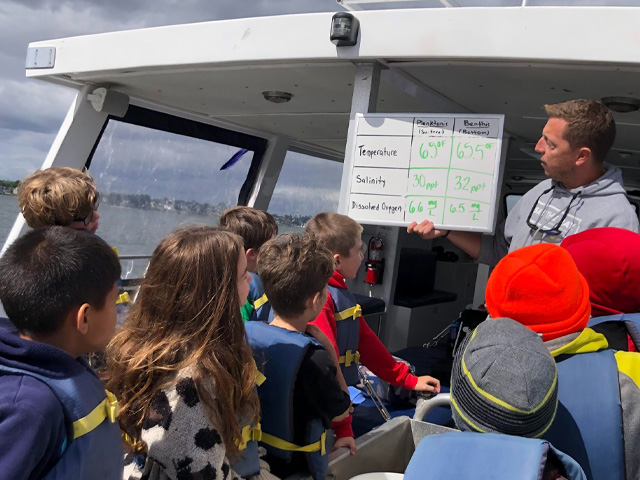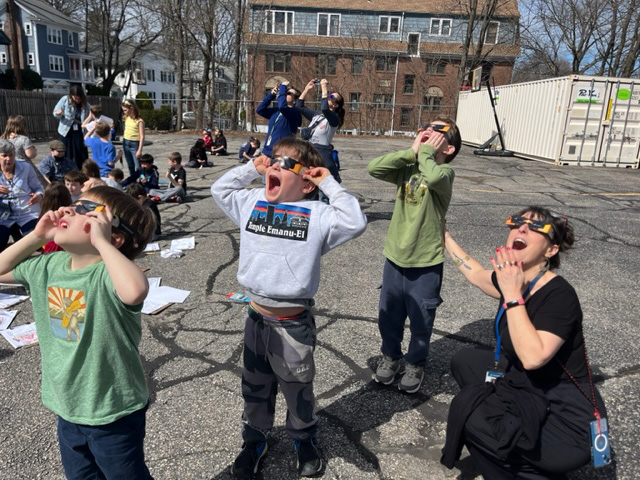Science at JCDSRI:
Fostering Curiosity, Critical Thinking, and Empathy
At the Jewish Community Day School of Rhode Island (JCDSRI), we understand that the world of science is vast, dynamic, and constantly changing. Our science curriculum is designed to spark curiosity, encourage inquiry, and build essential problem-solving skills in students from Nitzanim (3 year old program) through Fifth Grade. By integrating the Next Generation Science Standards (NGSS) with a hands-on, experiential approach, we provide a learning environment where students actively explore, experiment, and engage with the natural world.
Inquiry-Based Learning through the FOSS Science Kits
At JCDSRI, we believe that science should be an active, student-centered exploration. Using the FOSS Science Kits, our students engage with real-world phenomena, experiment, and apply the scientific method to discover how the world around them works. Each lesson and unit is rooted in experimentation, questioning, and hands-on discovery, encouraging students to ask questions, develop hypotheses, plan investigations, and analyze data.
For example, in First Grade, students might explore the properties of materials and their ability to change states, investigating ice melting, water boiling, and solids transforming into liquids. In Third Grade, students engage in investigations related to ecosystems, exploring how energy flows through living systems, tracking the relationship between plants, animals, and their environments. Through these experiences, our students not only learn about scientific concepts but also begin to appreciate the complexities of the world around them.

Science and Engineering Practices
The NGSS framework emphasizes eight key Science and Engineering Practices that guide our teaching approach. These practices help our students develop the skills they need to become thoughtful scientists, engineers, and problem-solvers. At JCDSRI, students are encouraged to:
- Ask questions and define problems (Science and Engineering)
- Develop and use models to understand systems
- Plan and carry out investigations, experimenting to gather evidence
- Analyze and interpret data to draw conclusions
- Use mathematics and computational thinking to model and solve problems
- Construct explanations and design solutions to engineering challenges
- Engage in argument from evidence, defending their conclusions
- Obtain, evaluate, and communicate information from multiple sources
These practices encourage a growth mindset, empowering students to take ownership of their learning, collaborate with peers, and develop resilience when facing challenges. They also provide students with the tools they need to engage in the scientific process, transforming them into active participants in their own education.

Making Connections Across Disciplines
The concepts introduced through the NGSS help students see the interconnectedness of science, engineering, and everyday life. These concepts guide students to look for patterns, analyze cause and effect relationships, and explore systems in the natural world. They also deepen students’ understanding of how science concepts apply across different disciplines. Some of the key crosscutting concepts explored include:
- Patterns – Recognizing patterns in data and systems
- Cause and Effect – Understanding how changes in one factor can lead to predictable outcomes
- Scale, Proportion, and Quantity – Examining relationships across different sizes, scales, and timeframes
- Systems and System Models – Understanding the interconnectedness of components within systems, from ecosystems to human-made systems
- Energy and Matter – Exploring how energy moves through systems and how matter changes form
- Structure and Function – Investigating the relationship between the physical properties of objects and their function
- Stability and Change – Understanding how systems can remain stable or change over time, and the forces driving these processes
By focusing on these concepts, students build a more holistic understanding of science, connecting what they are learning in one area to what they see in the world around them.
Disciplinary Core Ideas: A Comprehensive Foundation in Science
The NGSS organizes scientific knowledge into Disciplinary Core Ideas (DCIs), which form the foundation of our curriculum. These DCIs are divided into four main scientific disciplines:
- Physical Sciences – Concepts related to forces, motion, energy, matter, and chemistry
- Life Sciences – Topics in biology, ecology, genetics, and organism interactions
- Earth and Space Sciences – Exploring the Earth’s systems, weather, climate, and space phenomena
- Engineering, Technology, and Applications of Science – Connecting science with the design, creation, and improvement of technological solutions
At JCDSRI, we ensure that students receive a well-rounded education in each of these fields, while helping them understand how all the disciplines are interconnected. For example, in Third Grade, students might investigate energy flow in ecosystems, linking their knowledge of life sciences with their understanding of energy and matter from physical science.

Phenomena-Based Learning: Curiosity-Driven Science
A key aspect of the FOSS Science Kits is phenomena-based learning, where scientific inquiry begins with an observable event or situation that sparks students’ curiosity. These phenomena could be anything from the sudden appearance of a rainbow, to the changing of the seasons, or the growing of a plant from a seed. These phenomena serve as the starting point for inquiry and investigation.
In our Fourth Grade classroom, for example, students might observe the patterns of weather changes over time, prompting questions like, “Why does it rain?” or “What causes the wind to blow?” This curiosity drives students to investigate, gather data, and draw conclusions, helping them better understand how scientific concepts explain the world around them. By using real-world phenomena to engage students, we make science feel relevant and applicable to their daily lives.
Social-Emotional Learning (SEL) and Science: Fostering Collaboration and Growth
At JCDSRI, we understand that Social-Emotional Learning (SEL) is an essential part of our curriculum and plays an integral role in how students approach science learning. Through our SEL program, students are taught to work collaboratively, practice empathy, and take responsibility for their actions—skills that are critical for successful scientific inquiry.
When students collaborate on group experiments or discuss scientific phenomena, they learn to share ideas, listen to others, and resolve conflicts respectfully. For example, during a group investigation in Earth Science, students may have differing ideas about how a volcanic eruption impacts the environment. Through collaborative discussions and respectful listening, they work together to build a stronger, more comprehensive understanding. This approach aligns with the values of Chesed (kindness), Kavod (respect), and Achrayut (responsibility) that are central to our school’s mission.
Moreover, we use Universal Design for Learning (UDL) principles to ensure that every child can access and engage with the science curriculum. UDL allows us to differentiate instruction to meet the diverse needs of our students, whether they are visual, auditory, or kinesthetic learners. Whether through hands-on activities, visual models, or interactive digital resources, we ensure that all students can actively participate in the learning process.
Empowering Students for the Future
Our science curriculum at JCDSRI is more than just about memorizing facts—it’s about building curiosity, critical thinking, and the ability to problem-solve. It is about empowering our students to ask big questions, investigate the world around them, and take action to create positive change. By fostering an environment where students feel empowered to ask questions, investigate phenomena, and collaborate respectfully, we are helping them develop not only the scientific knowledge they need but also the emotional intelligence and life skills necessary to succeed in an ever-changing world.
With a curriculum grounded in Jewish values, Universal Design for Learning, and the principles of Positive Discipline, we are preparing students who are not only scientifically literate but also compassionate, curious, and capable of addressing the complex challenges of tomorrow.